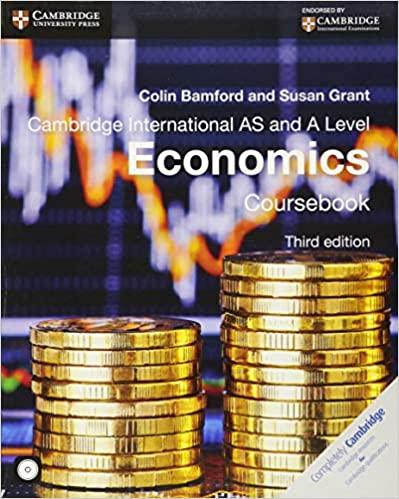Question
[Explain how firms that compete in the four different market structures determine profitability. Use specific examples from the simulations or the textbook to support your
[Explain how firms that compete in the four different market structures determine profitability. Use specific examples from the simulations or the textbook to support your claims.] Frontiers of Microeconomics (Ch 22)
This chapter examined the frontier of microeconomics. You may have noticed that we sketched out ideas rather than fully developing them. This is no accident. One reason is that you might study these topics in more detail in advanced courses. Another reason is that these topics remain active areas of research and, therefore, are still being fleshed out.
To see how these topics fit into the broader picture, recall theTen Principles of EconomicsfromChapter 1. One principle states that markets are usually a good way to organize economic activity. Another principle states that governments can sometimes improve market outcomes. As you study economics, you can more fully appreciate the truth of these principles as well as the caveats that come with them. The study of asymmetric information should make you more wary of market outcomes. The study of political economy should make you more wary of government solutions. And the study of behavioral economics should make you wary of any institution that relies on human decision making, including both the market and the government.
If there is a common theme to these topics, it is that life is messy. Information is imperfect, government is imperfect, and people are imperfect. Of course, you knew this long before you started studying economics, but economists need to understand these imperfections as precisely as they can if they are to explain, and perhaps even improve, the world around them.
- In many economic transactions, information is asymmetric. When there are hidden actions, principals may be concerned that agents suffer from the problem of moral hazard. When there are hidden characteristics, buyers may be concerned about the problem of adverse selection among the sellers. Private markets sometimes deal with asymmetric information with signaling and screening.
- Although government policy can sometimes improve market outcomes, governments are themselves imperfect institutions. The Condorcet paradox shows that majority rule fails to produce transitive preferences for society, and Arrow's impossibility theorem shows that no voting system can be perfect. In many situations, democratic institutions will produce the outcome desired by the median voter, regardless of the preferences of the rest of the electorate. Moreover, the individuals who set government policy may be motivated by self-interest rather than the national interest.
- The study of psychology and economics reveals that human decision making is more complex than is assumed in conventional economic theory. People are not always rational, they care about the fairness of economic outcomes (even to their own detriment), and they can be inconsistent over time.
Step by Step Solution
There are 3 Steps involved in it
Step: 1

Get Instant Access to Expert-Tailored Solutions
See step-by-step solutions with expert insights and AI powered tools for academic success
Step: 2

Step: 3

Ace Your Homework with AI
Get the answers you need in no time with our AI-driven, step-by-step assistance
Get Started


